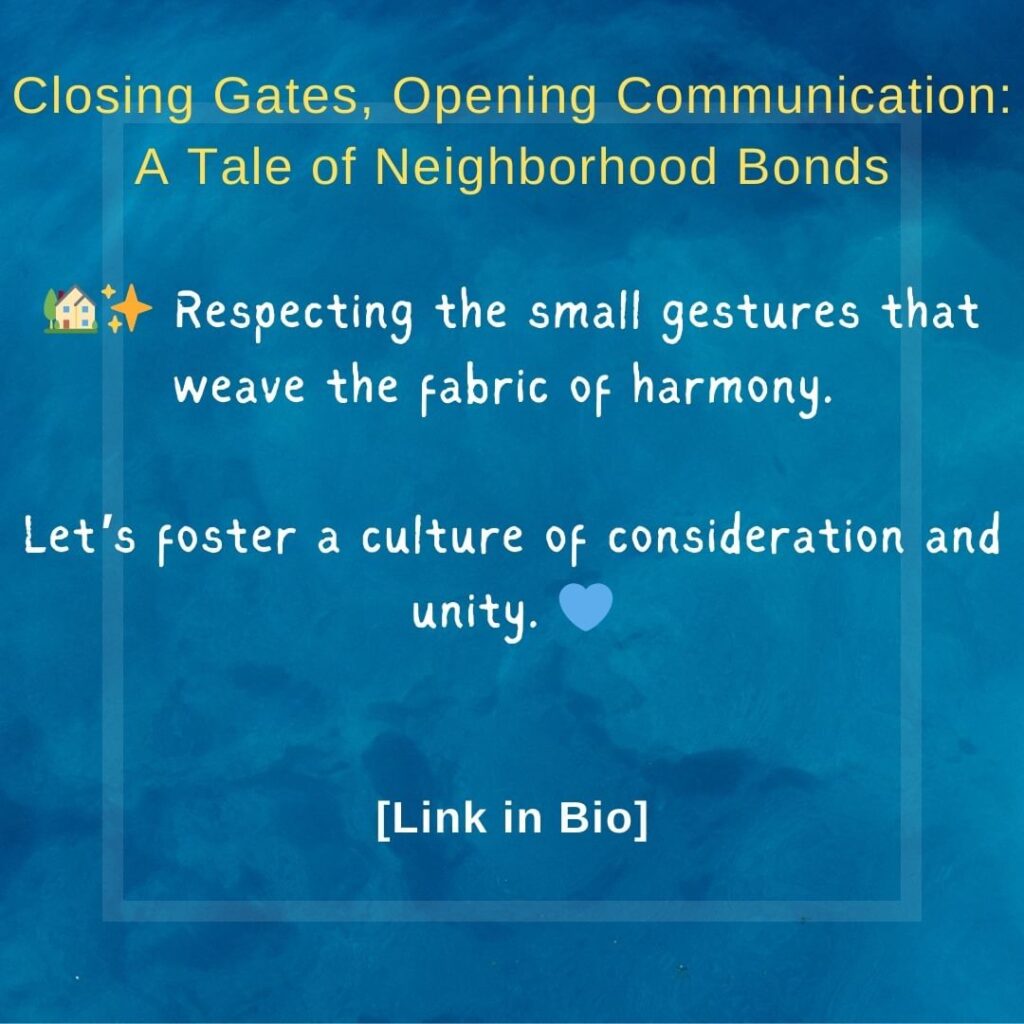In the tapestry of communal living, social responsibilities manifest through small acts of consideration. Take, for instance, the simple act of closing the main gate in a small society with only six bungalows. While for some, it’s a matter of adherence to rules, for others, it goes beyond mere regulations—it’s a gesture of genuine care.

Navigating Social Responsibilities: Bridging the Gap in Perceptions
In the fabric of communal living, shared responsibilities form the foundation of harmony. From closing the main gate to ensuring safety and unity, each action carries significance beyond its surface duty. However, challenges arise when interpretations diverge. Some view these responsibilities as gestures of genuine care, while others perceive them as mere inconveniences.
Addressing Divergent Perspectives
When faced with such disparities, it’s crucial to navigate this uncharted territory with empathy and understanding. Rather than framing conversations around rules, empathy should guide communication. Leading by example and fostering community understanding through open discussions can bridge the gap, reinfo
The Scenario: Unraveling Social Threads
In every society, there’s often an unspoken agreement on shared responsibilities. Closing the main gate is one such responsibility that not only ensures safety and privacy but also fosters a sense of unity. However, the challenge arises when not everyone interprets this responsibility in the same light.
The Divergence: Caring vs. Convenience
In the tapestry, most threads follow the same pattern—everyone diligently closes the gate behind them. Yet, there’s an outlier, a neighbor who seems oblivious to the shared responsibility. Attempts to communicate and address the issue yield temporary results, revealing a mindset where the act of care is perceived merely as a task on someone’s to-do list.
Navigating the Uncharted Territory
Dealing with such a scenario can be complex. The challenge is not just about closing a gate; it’s about bridging the gap in perceptions. How does one convey that an action is not just a duty but an expression of genuine concern for the collective well-being?
Integrating Self-Care: Amidst the complexities of communal living, it’s vital to remember the importance of self-care. Caring for others is commendable, but it should not come at the expense of neglecting oneself. Explore insightful tips on balancing communal responsibilities with personal well-being here.
Building Bridges, Not Walls
- Empathy in Communication: Rather than framing the conversation around rules, approach it with empathy. Understand their perspective and express your concerns about the shared space and safety.
- Leading by Example: Showcase consistent care through your actions. Let the repeated act of closing the gate become a testament to your genuine concern for the well-being of the community.
- Fostering Community Understanding: Initiate community discussions about shared responsibilities. Create a platform where everyone can express their views, fostering a sense of shared commitment.
Conclusion: Weaving a Tapestry of Harmony for handling social responsibilities
In the intricate weave of shared living, each thread plays a role. While it might take time for some threads to align, the eventual goal is to create a tapestry where every act of care, no matter how small, contributes to the overall harmony. It’s not just about closing a gate; it’s about understanding that every action resonates within the community, creating a melody of consideration and unity.
Do Follow for More Tips and Inspiration:
- Instagram: Follow us on Instagram
- Pinterest: Follow our Pinterest profile
FAQs related with “Social Responsibilities”
- Why are small acts of consideration important in communal living? Small acts of consideration, such as closing the main gate, foster unity, safety, and a sense of community in communal living spaces.
- How can we address divergent perspectives on social responsibilities? Divergent perspectives on social responsibilities can be addressed through empathy, understanding, and open communication within the community.
- What challenges arise when interpreting shared responsibilities differently? Challenges such as miscommunication, perceived inconvenience, and differing priorities may arise when interpreting shared responsibilities differently.
- How can empathy contribute to resolving conflicts related to social responsibilities? Empathy fosters understanding of others’ perspectives, allowing for more effective communication and conflict resolution regarding social responsibilities.
- What role does community understanding play in handling social responsibilities? Community understanding promotes shared commitment and cooperation in upholding social responsibilities, leading to a harmonious communal living environment.
- Why is it important to lead by example in matters of social responsibilities? Leading by example demonstrates genuine care and commitment to the well-being of the community, encouraging others to follow suit.
- How can community discussions contribute to fostering harmony in communal living spaces? Community discussions provide a platform for expressing views, addressing concerns, and collectively finding solutions to issues related to social responsibilities.
